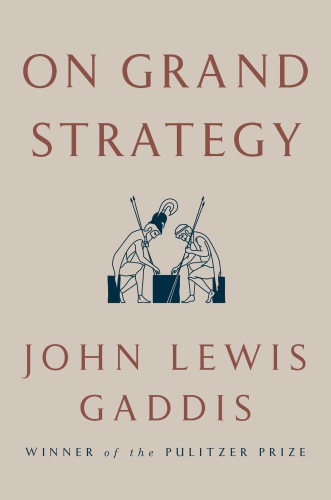
On Grand Strategy
کتاب های مرتبط
- اطلاعات
- نقد و بررسی
- دیدگاه کاربران
نقد و بررسی

February 15, 2018
A Pulitzer Prize-winning historian offers a capacious analysis of how leaders make strategic decisions.Drawing on a yearlong "Grand Strategy" course he teaches to Yale undergraduates, Gaddis (History/Yale Univ.; George F. Kennan: An American Life, 2011, etc.), the recipient of a National Humanities Medal in 2005, analyzes the processes and complexities involved in devising grand strategies: "the alignment of potentially unlimited aspirations with necessarily limited capabilities." The adjective "grand," he adds, has to do with "what's at stake," which is why grand strategies traditionally have been associated "with the planning and fighting of wars." Arguing that strategic leaders need to be flexible, creative, and observant, the author cites political theorist and philosopher Isaiah Berlin, who popularized a memorable line from an ancient Greek poet: "The fox knows many things, but the hedgehog knows one big thing." That big thing--an obsessive idea or abstract ideal--may make a leader appear decisive but is likely to prevent innovation. "Assuming stability is one of the ways ruins get made," Gaddis writes. "Resilience accommodates the unexpected." Elizabeth I, whom he admires, defied traditional expectations by "reigning without marrying, tolerating (within limits) religious differences, and letting a language gloriously grow." Rather than impose a grand design, she responded deftly to her changing world. Not so Xerxes and Napoleon, who mounted campaigns that failed because of limited "peripheral vision" blinding them to the variables of "landscapes, logistics, climates, the morale of their troops, and the strategies of their enemies." Abraham Lincoln, too, merits Gaddis' admiration: self-taught and astoundingly intuitive, Lincoln "managed polarities: they didn't manage him." The author returns often to Tolstoy and Carl von Clausewitz, both of whom respect theory and practice "without enslaving themselves to either." Abstraction and specificity "reinforce each other, but never in predetermined proportions." Both writers, Gaddis argues, considered the contradictions and irony of history with "the amplitude, imagination, and honesty" that makes them "the grandest of strategists."A lively, erudite study of the past in service of the future.
COPYRIGHT(2018) Kirkus Reviews, ALL RIGHTS RESERVED.

February 19, 2018
Yale historian Gaddis (George F. Kennan: An American Life) draws on decades of teaching to produce a fine summary of the complex concepts explored in his Grand Strategy seminar, full of vivid examples of leadership and strategic thinking, from the Persian king Xerxes to Churchill’s and Roosevelt’s WWII strategies. Leaning on political theorist Isaiah Berlin’s work for this study’s intellectual backbone, Gaddis takes his central metaphor from Berlin’s epigraph: “The fox knows many things, but the hedgehog knows one big thing.” The book shows the pitfalls of “hedgehog” leadership, which inflexibly concentrates on “one big thing,” often with disastrous results. Xerxes’s 480 B.C.E. invasion of Greece and the Spanish king Philip II’s ceaseless quest to return Catholicism to England, culminating with the Spanish Armada’s 1588 defeat, are prime examples. In contrast, Pericles’s early leadership of Athens and Abraham Lincoln’s presidency are likened to the fox’s knowledge of “many things.” That knowledge, of one’s ultimate objectives, capabilities, and limitations, and of conditions that present opportunities, gives great leaders flexibility and a sense of proportionality that support grand strategy: “the alignment of potentially infinite aspirations with necessarily limited capabilities.” Gaddis brings a deep knowledge of history and a pleasingly economical prose style to this rigorous study of leadership.

April 1, 2018
Grand strategy may be defined as the employment of all instruments of power to achieve the aims of a nation. Pulitzer Prize-winning author Gaddis (Robert A. Lovett Professor of Military & Naval History, Yale Univ.; George F. Kennan: An American Life) has compressed teachings from his Yale history courses and the Brady-Johnson Program in Grand Strategy into a succinct discussion of the requirements of a leader and how to think about one's aims. The author compares and contrasts several great leaders, from Xerxes to Franklin D. Roosevelt, along with analyzing their failures (e.g., Xerxes and Pericles) and successes (e.g., Abraham Lincoln and Elizabeth I). He classifies the qualities necessary for successful leadership in times of crisis and relies on extensive sources to dissect wittily the character and determination of historical influential figures such as Sun Tzu, St. Augustine, Carl von Clausewitz, Machiavelli, and America's Founding Fathers. He further describes how each individual was impacted by the force of public opinion and historical events of the time. VERDICT Highly recommended for history and leadership collections in both academic and public settings.--Edwin Burgess, Kansas City, KS
Copyright 2018 Library Journal, LLC Used with permission.

























دیدگاه کاربران